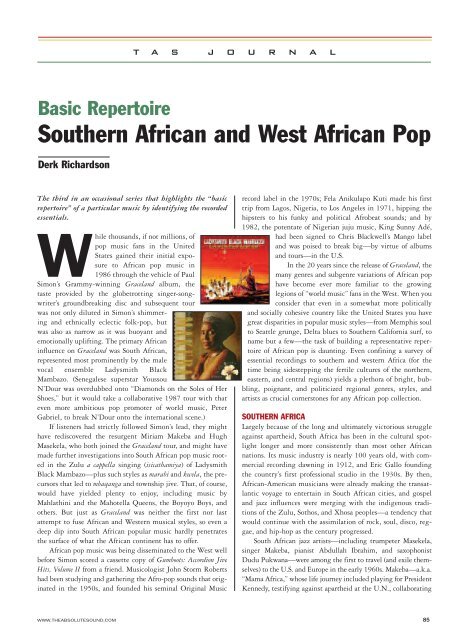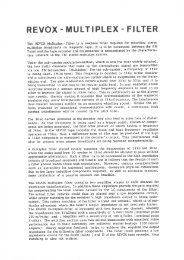in this issue
in this issue
in this issue
You also want an ePaper? Increase the reach of your titles
YUMPU automatically turns print PDFs into web optimized ePapers that Google loves.
T A S J O U R N A L<br />
Basic Repertoire<br />
Southern African and West African Pop<br />
Derk Richardson<br />
The third <strong>in</strong> an occasional series that highlights the “basic<br />
repertoire” of a particular music by identify<strong>in</strong>g the recorded<br />
essentials.<br />
While thousands, if not millions, of<br />
pop music fans <strong>in</strong> the United<br />
States ga<strong>in</strong>ed their <strong>in</strong>itial exposure<br />
to African pop music <strong>in</strong><br />
1986 through the vehicle of Paul<br />
Simon’s Grammy-w<strong>in</strong>n<strong>in</strong>g Graceland album, the<br />
taste provided by the globetrott<strong>in</strong>g s<strong>in</strong>ger-songwriter’s<br />
groundbreak<strong>in</strong>g disc and subsequent tour<br />
was not only diluted <strong>in</strong> Simon’s shimmer<strong>in</strong>g<br />
and ethnically eclectic folk-pop, but<br />
was also as narrow as it was buoyant and<br />
emotionally uplift<strong>in</strong>g. The primary African<br />
<strong>in</strong>fluence on Graceland was South African,<br />
represented most prom<strong>in</strong>ently by the male<br />
vocal ensemble Ladysmith Black<br />
Mambazo. (Senegalese superstar Youssou<br />
N’Dour was overdubbed onto “Diamonds on the Soles of Her<br />
Shoes,” but it would take a collaborative 1987 tour with that<br />
even more ambitious pop promoter of world music, Peter<br />
Gabriel, to break N’Dour onto the <strong>in</strong>ternational scene.)<br />
If listeners had strictly followed Simon’s lead, they might<br />
have rediscovered the resurgent Miriam Makeba and Hugh<br />
Masekela, who both jo<strong>in</strong>ed the Graceland tour, and might have<br />
made further <strong>in</strong>vestigations <strong>in</strong>to South African pop music rooted<br />
<strong>in</strong> the Zulu a cappella s<strong>in</strong>g<strong>in</strong>g (isicathamiya) of Ladysmith<br />
Black Mambazo—plus such styles as marabi and kwela, the precursors<br />
that led to mbaqanga and township jive. That, of course,<br />
would have yielded plenty to enjoy, <strong>in</strong>clud<strong>in</strong>g music by<br />
Mahlath<strong>in</strong>i and the Mahotella Queens, the Boyoyo Boys, and<br />
others. But just as Graceland was neither the first nor last<br />
attempt to fuse African and Western musical styles, so even a<br />
deep dip <strong>in</strong>to South African popular music hardly penetrates<br />
the surface of what the African cont<strong>in</strong>ent has to offer.<br />
African pop music was be<strong>in</strong>g dissem<strong>in</strong>ated to the West well<br />
before Simon scored a cassette copy of Gumboots: Accordion Jive<br />
Hits, Volume II from a friend. Musicologist John Storm Roberts<br />
had been study<strong>in</strong>g and gather<strong>in</strong>g the Afro-pop sounds that orig<strong>in</strong>ated<br />
<strong>in</strong> the 1950s, and founded his sem<strong>in</strong>al Orig<strong>in</strong>al Music<br />
record label <strong>in</strong> the 1970s; Fela Anikulapo Kuti made his first<br />
trip from Lagos, Nigeria, to Los Angeles <strong>in</strong> 1971, hipp<strong>in</strong>g the<br />
hipsters to his funky and political Afrobeat sounds; and by<br />
1982, the potentate of Nigerian juju music, K<strong>in</strong>g Sunny Adé,<br />
had been signed to Chris Blackwell’s Mango label<br />
and was poised to break big—by virtue of albums<br />
and tours—<strong>in</strong> the U.S.<br />
In the 20 years s<strong>in</strong>ce the release of Graceland, the<br />
many genres and subgenre variations of African pop<br />
have become ever more familiar to the grow<strong>in</strong>g<br />
legions of “world music” fans <strong>in</strong> the West. When you<br />
consider that even <strong>in</strong> a somewhat more politically<br />
and socially cohesive country like the United States you have<br />
great disparities <strong>in</strong> popular music styles—from Memphis soul<br />
to Seattle grunge, Delta blues to Southern California surf, to<br />
name but a few—the task of build<strong>in</strong>g a representative repertoire<br />
of African pop is daunt<strong>in</strong>g. Even conf<strong>in</strong><strong>in</strong>g a survey of<br />
essential record<strong>in</strong>gs to southern and western Africa (for the<br />
time be<strong>in</strong>g sidestepp<strong>in</strong>g the fertile cultures of the northern,<br />
eastern, and central regions) yields a plethora of bright, bubbl<strong>in</strong>g,<br />
poignant, and politicized regional genres, styles, and<br />
artists as crucial cornerstones for any African pop collection.<br />
SOUTHERN AFRICA<br />
Largely because of the long and ultimately victorious struggle<br />
aga<strong>in</strong>st apartheid, South Africa has been <strong>in</strong> the cultural spotlight<br />
longer and more consistently than most other African<br />
nations. Its music <strong>in</strong>dustry is nearly 100 years old, with commercial<br />
record<strong>in</strong>g dawn<strong>in</strong>g <strong>in</strong> 1912, and Eric Gallo found<strong>in</strong>g<br />
the country’s first professional studio <strong>in</strong> the 1930s. By then,<br />
African-American musicians were already mak<strong>in</strong>g the transatlantic<br />
voyage to enterta<strong>in</strong> <strong>in</strong> South African cities, and gospel<br />
and jazz <strong>in</strong>fluences were merg<strong>in</strong>g with the <strong>in</strong>digenous traditions<br />
of the Zulu, Sothos, and Xhosa peoples—a tendency that<br />
would cont<strong>in</strong>ue with the assimilation of rock, soul, disco, reggae,<br />
and hip-hop as the century progressed.<br />
South African jazz artists—<strong>in</strong>clud<strong>in</strong>g trumpeter Masekela,<br />
s<strong>in</strong>ger Makeba, pianist Abdullah Ibrahim, and saxophonist<br />
Dudu Pukwana—were among the first to travel (and exile themselves)<br />
to the U.S. and Europe <strong>in</strong> the early 1960s. Makeba—a.k.a.<br />
“Mama Africa,” whose life journey <strong>in</strong>cluded play<strong>in</strong>g for President<br />
Kennedy, testify<strong>in</strong>g aga<strong>in</strong>st apartheid at the U.N., collaborat<strong>in</strong>g<br />
WWW.THEABSOLUTESOUND.COM 85










